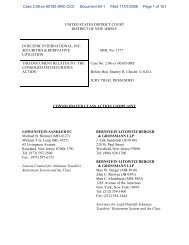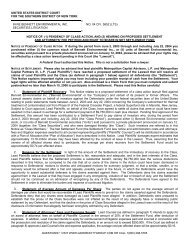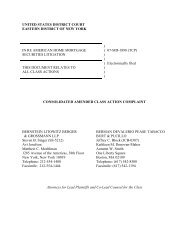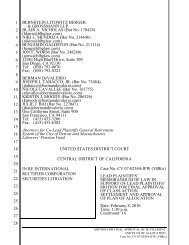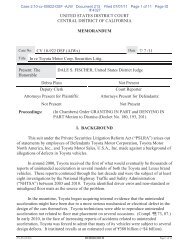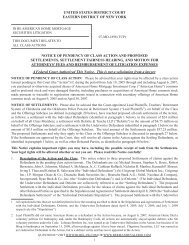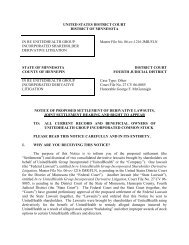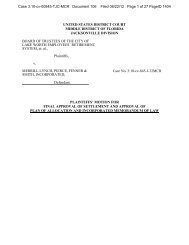to view the Lawdragon's - Bernstein Litowitz Berger & Grossmann LLP
to view the Lawdragon's - Bernstein Litowitz Berger & Grossmann LLP
to view the Lawdragon's - Bernstein Litowitz Berger & Grossmann LLP
You also want an ePaper? Increase the reach of your titles
YUMPU automatically turns print PDFs into web optimized ePapers that Google loves.
as <strong>the</strong> Humanitarian Law Center, <strong>the</strong> Belgrade Center forHuman Rights and <strong>the</strong> Helsinki Committee for HumanRights in Serbia. (Most observers have also given praise forachievements in o<strong>the</strong>r areas.)Vladimir Petrovic, an academic who was an analyst in<strong>the</strong> war crimes prosecu<strong>to</strong>r’s office when first inter<strong>view</strong>edfor this article, described <strong>the</strong> problem as “<strong>the</strong> vacancy in<strong>the</strong> middle.” Though <strong>the</strong> ICTY started with some relativelylow-level offenders, it eventually developed a <strong>to</strong>p-downstrategy. Serbia’s War Crimes Chamber, in contrast, couldtake a bot<strong>to</strong>m-up approach – starting with <strong>the</strong> lowest-leveloffenders and moving up <strong>to</strong> <strong>the</strong> mid-level commandersoutside <strong>the</strong> ICTY’s range of cases.“The hope was that we would meet somewhere in <strong>the</strong>middle,” Petrovic said. If this convergence fails <strong>to</strong> takeplace, he added, it will create a significant hole in <strong>the</strong> legalrecord established by <strong>the</strong> cases.A debate remains over <strong>the</strong> severity of this shortcoming,as well as its causes. Competing <strong>view</strong>s over <strong>the</strong>se issueshave created tension between Vukcevic’s office andKandic’s Humanitarian Law Center – two institutionsostensibly on <strong>the</strong> same side of war crimes issues, led by twoindividuals whose public statements about <strong>the</strong> importanceof accountability efforts often echo each o<strong>the</strong>r.Kandic believes that <strong>the</strong> indictments and some of <strong>the</strong>chamber’s rulings show an intention <strong>to</strong> minimize <strong>the</strong>responsibility of <strong>the</strong> state of Serbia, and <strong>to</strong> focus blameinstead on individual bad apples at <strong>the</strong> lower level. Oneof <strong>the</strong> goals of war crimes trials is <strong>to</strong> establish individualcriminal responsibility for atrocities, something Kandicreadily acknowledges. (One <strong>the</strong>ory in <strong>the</strong> field of transitionaljustice is that individualizing crimes can help prevent victimpopulations from holding grudges against entire groupsof people.) Still, she contends that indictments that moreaggressively move up <strong>the</strong> chain of command and betterestablish <strong>the</strong> context of <strong>the</strong> crimes would place a moreappropriate emphasis on state institutions. This would bemore consistent with <strong>the</strong> record established by <strong>the</strong> ICTY– that much of <strong>the</strong> Serb wartime leadership engaged in ajoint-criminal enterprise during <strong>the</strong> conflict.Greater state responsibility might also support legal<strong>the</strong>ories of liability that Serbia owes reparations <strong>to</strong> victimsof <strong>the</strong> wars. Bosnia-Herzegovina sued Serbia before <strong>the</strong>International Court of Justice for alleged violations of<strong>the</strong> Genocide Convention. In a 2007 ruling, <strong>the</strong> ICJ heldthat <strong>the</strong> Srebrenica massacre amounted <strong>to</strong> genocide butthat Serbia was not directly responsible for <strong>the</strong> acts carriedout by <strong>the</strong> forces in <strong>the</strong> area, <strong>the</strong> Republika Srpska army.The court did hold that Serbia violated <strong>the</strong> conventionby failing <strong>to</strong> s<strong>to</strong>p <strong>the</strong> killings and failing <strong>to</strong> turn over keysuspects. (Among <strong>the</strong> controversies of <strong>the</strong> case, <strong>the</strong> courtdid not require Serbia <strong>to</strong> turn over documents that mighthave shed more light on <strong>the</strong> alleged participation ofYugoslavia’s leadership.)Vukcevic's office has contended that Kandic, who istrained as a sociologist and not a lawyer, is incorrect in herassessments of its performance, and that cases have onlybeen limited by <strong>the</strong> evidence available. For example, in<strong>the</strong> Lovas case against former army officials, among o<strong>the</strong>rdefendants, for <strong>the</strong> killing of 70 civilians in Lovas, Croatia,in 1991, Kandic criticized <strong>the</strong> indictment for not targetingany army generals. Vukcevic issued a public response that<strong>the</strong> “<strong>the</strong> indictment included all individuals for whomit was possible <strong>to</strong> find evidence of involvement” and that“<strong>the</strong>re was no evidence of [higher-ranking army officers]having any knowledge of <strong>the</strong> events in Lovas ei<strong>the</strong>r beforeor during" <strong>the</strong> commission of <strong>the</strong> crimes.In responding <strong>to</strong> questions for this article, Vukcevicsaid that most of <strong>the</strong> higher-ranking officials have alreadybeen indicted by <strong>the</strong> ICTY. He said his team operates by<strong>the</strong> principles of "independence, resistance <strong>to</strong> all sorts ofpressures (political ones in particular), and <strong>the</strong> equality oftreatment for all irrespective of <strong>the</strong>ir ethnic backgrounds,religious beliefs or positions in <strong>the</strong> political and commandstructures." He added that his office is in <strong>the</strong> early stagesof potential cases against “individuals who occupied highpositions in <strong>the</strong> state system” during <strong>the</strong> wars.The Belgrade Center for Human Rights, which untilrecently was led by ano<strong>the</strong>r of <strong>the</strong> region’s most respectedactivists (and scholars), Vojin Dimitrijevic, who died Oct. 5at <strong>the</strong> age of 81, does not believe that <strong>the</strong> prosecu<strong>to</strong>r’s office“is avoiding <strong>the</strong> prosecution of <strong>the</strong> <strong>to</strong>pmost army and policeofficers,” according <strong>to</strong> a report issued earlier this year. Theorganization instead blames obstructive forces within<strong>the</strong> government and <strong>the</strong> challenges posed by regionalcooperation, with so many witnesses outside Serbia’sborder. The report noted a number of complications,including that a “considerable number of <strong>the</strong> Army ofSerbia current command staff” fought during <strong>the</strong> Kosovowar, and that former Milosevic spokesman Dacic (nowPrime Minister) had a prominent role in <strong>the</strong> government asa deputy prime minister.One of <strong>the</strong> most high-profile and controversial of <strong>the</strong>early cases before <strong>the</strong> War Crimes Chamber was broughtin 2005, after <strong>the</strong> Humanitarian Law Center acquired atape of <strong>the</strong> no<strong>to</strong>rious Scorpions paramilitary unit executingsix Muslims during <strong>the</strong> time of <strong>the</strong> Srebrenica massacresin July 1995. The killings <strong>to</strong>ok place in Trnovo, RepublikaSrpska, where <strong>the</strong> unit had taken <strong>the</strong>ir captives. TheHumanitarian Law Center made <strong>the</strong> tape available <strong>to</strong> <strong>the</strong>ICTY, which showed it at <strong>the</strong> Milosevic trial, and <strong>to</strong> <strong>the</strong>media, whose broadcasting of <strong>the</strong> footage was seen as animportant first step in getting citizens <strong>to</strong> begin <strong>to</strong> acceptthat Serbs had committed grave war crimes. The tape alsoresulted in Serb police arresting <strong>the</strong> perpetra<strong>to</strong>rs who werevisible as members of <strong>the</strong> Scorpions unit; five were indicted,including <strong>the</strong> commander, Slobodan Medic. Humanrights advocates criticized <strong>the</strong> indictment for describingL A W D R A G O N 46 I s s u e 13



